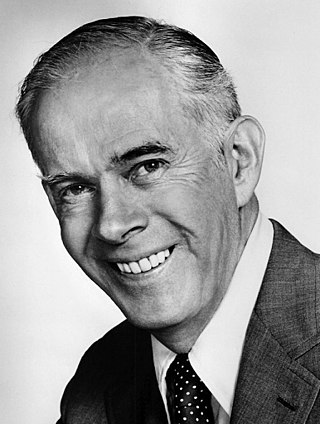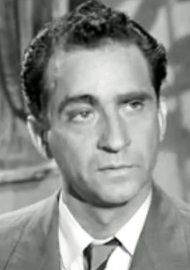Related Research Articles

Joseph Vernon "Big Joe" Turner Jr. was an American blues shouter from Kansas City, Missouri. According to songwriter Doc Pomus, "Rock and roll would have never happened without him". Turner's greatest fame was due to his rock and roll recordings in the 1950s, particularly "Shake, Rattle and Roll", but his career as a performer endured from the 1920s into the 1980s.

The Blues Brothers are an American blues and soul revivalist band founded in 1978 by comedians Dan Aykroyd and John Belushi as part of a musical sketch on Saturday Night Live. Belushi and Aykroyd were lead vocalist 'Joliet' Jake Blues and harmonica player and vocalist Elwood Blues, respectively, donning black suits with matching trilby hats and sunglasses. The band was composed of well-known musicians and debuted as the musical guest in a 1978 episode of Saturday Night Live, opening the show performing "Hey Bartender" and "Soul Man".

John Randolph Webb was an American actor, television producer, director, and screenwriter, most famous for his role as Joe Friday in the Dragnet franchise, which he created. He was also the founder of his own production company, Mark VII Limited.

Bert Kaempfert was a German orchestra leader, multi-instrumentalist, music producer, arranger, and composer. He made easy listening and jazz-oriented records and wrote the music for a number of well-known songs, including "Strangers in the Night", “Danke Schoen” and "Moon Over Naples".

Harry Morgan was an American actor whose television and film career spanned six decades. Morgan's major roles included Pete Porter in both December Bride (1954–1959) and Pete and Gladys (1960–1962); Officer Bill Gannon on Dragnet (1967–1970); Amos Coogan on Hec Ramsey (1972–1974); and his starring role as Colonel Sherman T. Potter in M*A*S*H (1975–1983) and AfterMASH (1983–1985). Morgan also appeared as a supporting player in more than 100 films.

David Roger Johansen is an American singer, songwriter and actor. He is best known as a member of the seminal proto-punk band the New York Dolls. He is also known for his work under the pseudonym Buster Poindexter, and for playing the Ghost of Christmas Past in Scrooged.

Pete Kelly's Blues is a 1955 musical crime film based on the 1951 radio series. It was directed by and starred Jack Webb in the title role of a bandleader and musician. Janet Leigh is featured as party girl Ivy Conrad, and Edmond O'Brien as a gangster who applies pressure to Kelly. Peggy Lee portrays alcoholic jazz singer Rose Hopkins. Ella Fitzgerald makes a cameo as singer Maggie Jackson. Lee Marvin, Martin Milner, and Jayne Mansfield also make early career appearances.

James Wesley Dodd was an American actor, singer and songwriter best known as the master of ceremonies for the popular 1950s Walt Disney television series The Mickey Mouse Club, as well as the writer of its well-known theme song "The Mickey Mouse Club March." A different version of this march, much slower in tempo and with different lyrics, became the alma mater that closed each episode.

Beryl Cyril Sheldon Jr., known professionally as Jack Sheldon, was an American musician, singer, and actor. He was a member of the band on The Merv Griffin Show and participated in episodes of the educational music television series Schoolhouse Rock!, where he became known for his distinctive voice.
Pete Kelly's Blues can refer to:
"Pete Kelly's Blues" is a popular song featured in the movie of the same name. The music was written by Ray Heindorf, the lyrics by Sammy Cahn. The song was published in 1955.
Pete Kelly's Blues was an American crime-musical radio drama which aired over NBC as an unsponsored summer replacement series on Wednesday nights at 8 pm (et) from July 4 through September 19, 1951. The series starred Jack Webb as Pete Kelly and was created by writer Richard L. Breen, who had previously worked with Webb on Pat Novak for Hire; James Moser and Jo Eisinger wrote most of the other scripts.

Pete Candoli was an American jazz trumpeter. He played with the big bands of Woody Herman and Stan Kenton and worked in the studios of the recording and television industries.

Spring Heeled Jack is a third wave ska band based out of New Haven, Connecticut. The band was formed by guitarist/vocalist Ron Ragona and drummer Dave Karcich in 1991. After a short breakup, Ragona and Karcich reformed the band with a new lineup. This lineup went on to record two albums before announcing a hiatus in 2000. While the band members moved on to perform in several new bands, their intention was to play the occasional reunion show. This plan would never come to fruition as a cerebral aneurysm would be cause for Karcich's death in 2002. In 2015, several band members returned to reform the band full-time. A third studio album, Sound Salvation, followed in 2017.

Ray Anthony is an American bandleader, trumpeter, songwriter, and former actor. He is the last surviving member of the Glenn Miller Orchestra.
William DeClercq Reynolds was an American actor. He was best known for his role as Special Agent Tom Colby in the 1960s television series The F.B.I. and his film and television roles during the 1950s through the 1970s.
Charles Richard Cathcart was an American Dixieland trumpet player who was best known as a member of The Lawrence Welk Show in which he appeared from 1962 to 1968.

The Money Trap is a 1965 American crime drama film directed by Burt Kennedy, written by Walter Bernstein based on the novel of the same name by Lionel White, and starring Glenn Ford, Elke Sommer, and Rita Hayworth.The supporting cast features Ricardo Montalbán, Joseph Cotten, and James Mitchum.

Piano Blues is a 2003 documentary film directed by Clint Eastwood as the seventh installment of the documentary film series The Blues produced by Martin Scorsese. The film features interviews and live performances of piano players Ray Charles, Dave Brubeck, Dr. John and Marcia Ball.

Than Wyenn was an American character actor. His acting career spanned more than forty years with more than 150 credits in film and television. He may be best known for his role in the 1960 Twilight Zone episode "Execution", as well as roles in Imitation of Life in 1959 and Splash in 1984.
References
- ↑ The Complete Directory to Prime Time Network and Cable TV Shows 1946-Present . Ballantine Books. 2003. p. 930. ISBN 0-345-45542-8.